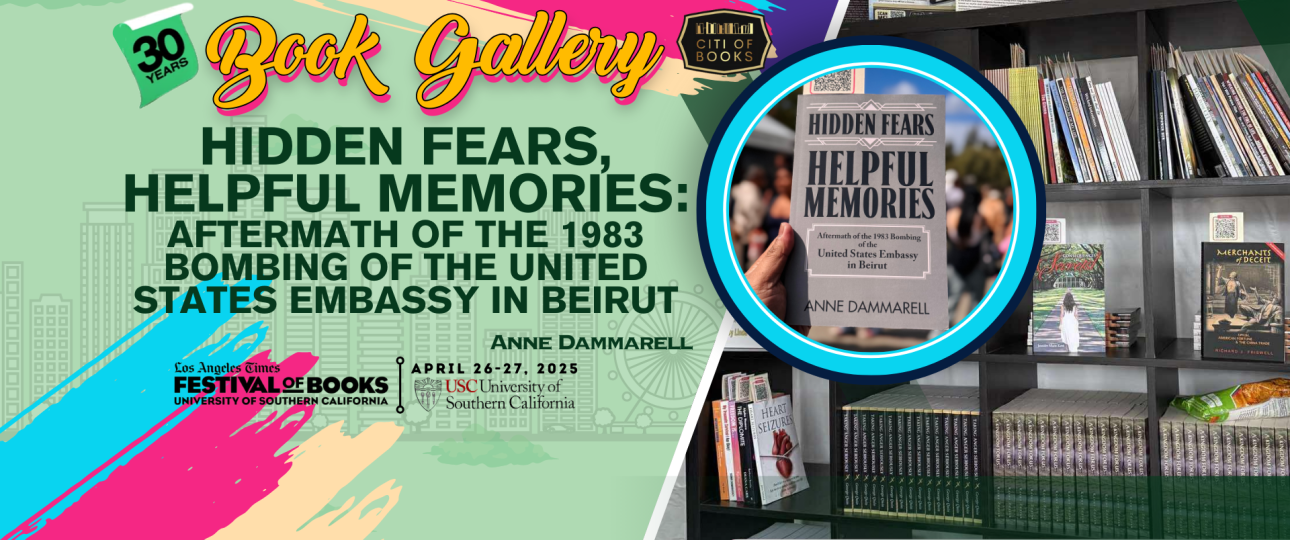
As the pages of history turn, we find ourselves reflecting on a remarkable milestone—the 30th Los Angeles Times Festival of Books, the largest book festival in the United States, held on April 26-27, 2025. Set against the stunning backdrop of the University of Southern California campus, this annual celebration of literature brought together thousands of book lovers, authors, and industry professionals for a weekend brimming with literary magic.
Attracting around 150,000 attendees from Southern California and beyond, the festival was a testament to the enduring appeal of literature and the community it fosters. Each event, each conversation, and each shared moment contributed to a rich tapestry of experiences that celebrated the diverse voices and stories that shape our world.
This year, Citi of Books was thrilled to be part of this vibrant gathering, where the love for literature was palpable in the air. Whether you were a lifelong bibliophile or a curious newcomer exploring the world of books, the festival provided a unique opportunity to connect with fellow enthusiasts and share our passion for the written word.
As we look back on this unforgettable weekend, we invite you to join us in reliving the highlights of Citi of Books’ gallery during the 30th Los Angeles Times Festival of Books—a true celebration of the literary arts! A book included in the gallery was “Hidden Fears, Helpful Memories: Aftermath of the 1983 Bombing of the United States Embassy in Beirut” by Anne Dammarell.
Anne Dammarell was born in Cincinnati. Ohio on January 2, 1938. Upon graduating from Our Lady of Cincinnati College in 1960, she interviewed housewives throughout the country about P&G products for a couple of years before living in Europe a few years.
In 1965 she joined the Agency for International Development serving in Washington, DC with the Office of International Training then as Afghanistan Desk Officer before being posted to Lebanon and Sri Lanka. Anne retired in 1988.
As a volunteer she taught English at neighborhood Schools, Sacred Heart and Sitar Art Center and then in Cairo and Bangkok with the Maryknoll Fathers and Brothers.
In 1994 Anne earned a Georgetown University Master’s degree with her thesis, Hidden Fears, Helpful Memories: Aftermath of the 1983 Bombing of the United States Embassy in Beirut.
“Hidden Fears, Helpful Memories: Aftermath of the 1983 Bombing of the United States Embassy in Beirut” investigates how Foreign Service Officers (FSOs) were prepared for danger posts, how they reacted to the trauma of the bombing, and how the U.S. State Department addressed their psychological needs.
Through interviews and anonymous questionnaires, Dammarell uncovers that many FSOs experienced post-traumatic stress symptoms but were not adequately trained or supported in processing these emotions. This lack of preparation and follow-up care delayed their ability to heal from the psychological wounds inflicted by the bombing.
Many FSOs, when confronted with the trauma of the bombing, did not immediately acknowledge the need for psychological help, either due to cultural resistance to mental health support or a lack of awareness about the effects of trauma. The Department of State, according to Dammarell, failed to provide sufficient resources to address the psychological impact on its employees, leaving many to cope on their own. While some FSOs instinctively talked to colleagues or family members to process their emotions, others did not recognize or confront the need for professional mental health care. This lack of institutional support led to long-term psychological consequences, with many survivors experiencing ongoing symptoms of post-traumatic stress, though only one FSO described full-blown PTSD.
Dammarell also reflects on the broader implications of the bombing, noting the increasing vulnerability of diplomats to terrorist attacks, which had escalated since the 1979 Iranian hostage crisis. The bombing led to a transformation in embassy operations, with heightened security measures making it harder for FSOs to maintain their open and relational roles.
However, despite the dangers, there remains a lack of support for FSOs working in high-risk environments. Through personal reflection and interviews, Dammarell sheds light on the hidden emotional toll on those who survived the bombing, urging a reevaluation of how the U.S. government prepares and supports its diplomats serving in dangerous regions.
You can contact us at +1 877-389-2759 or send a message at the following links:
- info@citiofbooks.com
- https://citiofbooks.com/
- https://www.facebook.com/COBNMUSA/
- https://www.instagram.com/citiofbooks/
- https://www.threads.net/@citiofbooks?hl=en
- https://x.com/CITIOFBOOKSINC
- https://www.tiktok.com/@citiofbooksinc
- https://www.youtube.com/@citiofbooks
- https://www.pinterest.com/CitiofBooksinc/
- https://bsky.app/feeds

